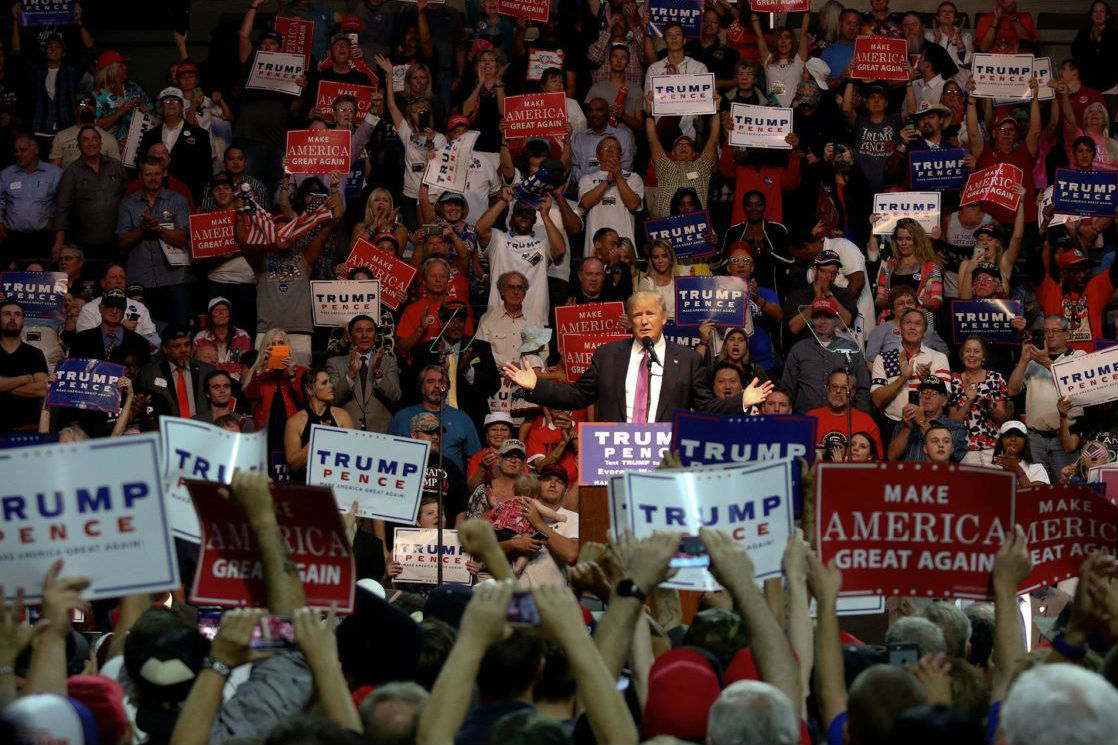Washington state has never been Trump Country.
Long before the infamous Access Hollywood tape surfaced and top party leaders began to withdraw support for the Republican presidential nominee in droves, members of the local GOP made clear their disdain for the candidate.
Certainly, some local Republicans were faster than others with their denunciations. U.S. Senate candidate and former state party chair Chris Vance got out front with his non-endorsement, and took it on the chin from conservatives for his supposed treason. Gubernatorial candidate Bill Bryant was more reticent, but came around to the Never Trump camp well before Labor Day. Several prominent businesspeople, including billionaire real-estate developer Martin Selig, abandoned the candidate months ago. Now, with the release of the Access Hollywood video, 12 state delegates to the Republican National Convention have signed a letter calling on Trump to step down from the ticket.
The exception to all this is Susan Hutchison, the state party chairwoman. She famously confronted Ted Cruz at the RNC after the Texas senator and onetime candidate declined to endorse Trump, then doubled down on her support for the nominee this weekend by suggesting that his taped confession of sexual assault and adultery is forgivable because he was a registered Democrat at the time of his comments. But in Hutchison’s case, the exception proves the rule: The backlash against her from other state conservatives has shown how out-of-line Trump and his supporters are from mainstream Republican thought in Washington.
There’s little doubt that there is a healthy dose of political expediency at play here. Even in a good electoral environment, Republicans in Washington face uphill battles to statewide victory, as shown by its 30-year losing streak for the governor’s mansion. In the GOP electoral calculus, suburban Eastside voters are absolutely vital for victory, and they are precisely the kind of moderate, college-educated voters that pollsters have found to be fundamentally allergic to Trump. Woe to the candidate who ties her fortune to the Orange Star from Manhattan.
But it is also true that the Republican Party in Washington has long maintained a streak of moderation that has disappeared across much of the country. This is a state where a “Dan Evans Republican”—that is, a moderate—is still spoken of as a political model, not an extinct species. A Trump victory would make such moderation all the more difficult to maintain, as it would lend unfortunate legitimacy to the extremism Trump embraces; indeed, what success Trump has already has likely dealt a blow to moderate Republicans’ chances in this year’s election.
But this is bigger than 2016. With it now appearing that Trump’s candidacy is in a tailspin and that his failure will bring about a reckoning for the Republican Party, it may be the moment for a Washington brand of Republican moderation to flex its muscle, reassert itself, and wrest some control back from the radicals who have driven the party to its present state of chaos.
Doing so would require political bravery well beyond denouncing an already-battered candidate, as it would require a clear understanding of what forces led to Trump in the first place, so that the party could exorcise those forces and move forward. For as outrageous as Trump is, he is not the outlier some make him out to be. He is the product of a political party that has had trouble with lines: the line between legitimate immigration policy and xenophobia; between legitimate terror threats and blind hostility toward Muslims; between eschewing political correctness and eschewing common human decency. Too often they darted across these lines for an easy vote; now they’ve got themselves stuck over there with Trump.
It’s time for moderate Republicans to take the lead and forge a new path for the party. Given local Republicans’ history with Trump, we are hopeful that such a movement will start right here.
editorial@seattleweekly.com






